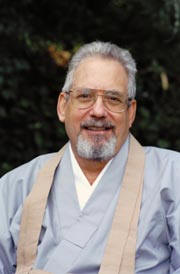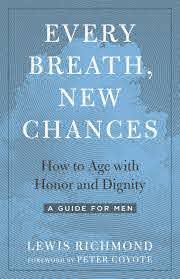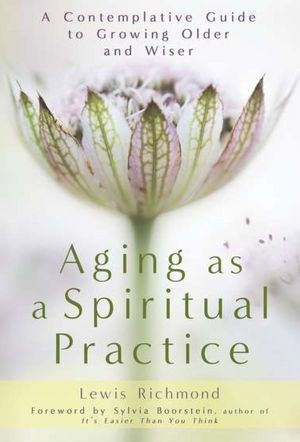 Lew Richmond
Lew Richmond
Can't keep up with all that Lew does and posts. Check his sites, get on his list. He's the founder of the Vimala Sangha in Mill Valley, author, musician - he and I were ordained together by Shunryu Suzuki in 1971. He was always generous with his time and good advice when I was working on Crooked Cucumber and as I continued interviewing people, and working on the Suzuki lectures. Lew was most enthusiastic about helping me to received funding and was on the Shunryu Suzuki Legacy Project committee along with Steve Stucky, Michael Wenger, and Ed Sattizahn I will always be grateful for Lew's encouragement and the energy he put into helping the Cuke Archives to flourish. - DC
His website: www.lewisrichmond.com
Read his support statement from the Cuke 2020 Presentation
Cuke Podcasts with Lew 2020 🔊 | 2022 🔊
Cuke interview with Lew Richmond
Lew's new book late 2020:
 EVERY
BREATH, NEW CHANCES: HOW TO AGE WITH HONOR AND DIGNITY—A GUIDE FOR MEN
(and the women who love them), and I’ve already received accolades from professionals
in the field such as Jed Diamond, Ph.D. and Paula Spencer Scott, best-selling
aging expert. The book has a forward by my close friend, the actor Peter
Coyote. It also includes an innovative contemplative practice I call “Deep Mind
Reflections”; there is one at the end of each chapter, and these are a kind of
self-guided visualization on many themes important to aging men (and women too):
virility and power, what it means to be a man, retirement, illness, divorce and
loneliness, and so on.
EVERY
BREATH, NEW CHANCES: HOW TO AGE WITH HONOR AND DIGNITY—A GUIDE FOR MEN
(and the women who love them), and I’ve already received accolades from professionals
in the field such as Jed Diamond, Ph.D. and Paula Spencer Scott, best-selling
aging expert. The book has a forward by my close friend, the actor Peter
Coyote. It also includes an innovative contemplative practice I call “Deep Mind
Reflections”; there is one at the end of each chapter, and these are a kind of
self-guided visualization on many themes important to aging men (and women too):
virility and power, what it means to be a man, retirement, illness, divorce and
loneliness, and so on.
You can learn all about the book, and purchase it if you want, on Amazon here, or if you prefer not to shop on Amazon, a good alternative is Goodreads here.
An article in Jan. 2021 Lion's Roar about his new book on aging for men, EVERY BREATH, NEW CHANCES: How Old Is This Moment?
Michael Kay, author and holistic financial advisor, interviewed Lew about his
new book on aging for men, EVERY BREATH, NEW CHANCES. Lew says, "Michael is a
real innovator with a broad audience; his website is full of interesting
content."
You can listen to their conversation here.

Books by Lew Richmond cuke page - Lew's site's page on books
Living and Aging as a Spiritual Practice (old website)
Lewis Richmond writing for the Good Men Project -- Lew wrote: I am now a weekly columnist on a major website, The Good Men Project which began as a forum for men to learn to be better men, but has expanded to encompass many related areas in wellness, gender and sexuality, politics, and more. I will be writing on a variety of topics related to my five published books and other observations of current trends. My latest column reflects on the radical transformation of the historical Buddha from a prince of privilege and hereditary warrior to a peaceful monk. See it here.
Memories of Suzuki Roshi From Wind Bell and DC Files - #30 - Lew Richmond
Remembering a Man of Wisdom by Lewis Richmond, an article about Shunryu Suzuki published in 1996 in Interbeing Magazine.
Lew on Shunryu Suzuki from Lion's Roar (below)
Recent articles by Lewis
Richmond on Lion's Roar.
Lew Richmond played an important role in getting Shunryu Suzuki disciples' meetings going.
His support for this work to preserve the legacy of Shunryu Suzuki has also been crucial at times.
September 4, 2020 - Aging is Reality - an excerpt from Lew's upcoming Tricycle online course on Aging as a Spiritual Practice.
Authentic Life - an interview with Lew from June 2010 issue of Tricycle. Here are a couple of brief excerpts from that interview where Lew says some things about Suzuki Roshi's teaching and intention. Here are three photos of Lew from that interview.
8-21-13 - Lew Richmond on PBS Religion and Ethics show
Religion and Ethics extended interview
3-17-13 - Lew Richmond on Huff post on emptiness
"Emptiness" is also the term that my own teacher Shunryu Suzuki used, though he usually added context. Once, speaking of emptiness he said, "I do not mean voidness. There is something, but that something is something which is always prepared for taking some particular form." Another time, speaking of the feeling tone of emptiness, he said, "Emptiness is like being at your mother's bosom and she will take care of you."
7 Practices That Restored My Buddhist Faith - Lew Richmond in Huff Post. Also am saving this in Reflections in case it disappears from Huff Post.
Lew Richmond's articles on Huffington Post
Lew's Twitter Feed and Lew's Facebook page
Lewis is also active on Tricycle magazine's online community site.
8-26-14 - The Melanthium Band - Lew Richmond
I have recently become part of a new music group called THE MELANTHIUM BAND--trumpet, violin, string bass, piano. Many people who know my books and teaching may not know that I was trained as a classical pianist and composer, and now I have returned to that. Our musical style is best described as contemporary classical, with a jazz inflection. Most of the pieces are my original compositions. In order to distinguish that activity from my Buddhist teaching and author work Melanthium has begun its own Constant Contact mail list identity. I have taken the liberty of adding your name to that list, so from now on when you get an email from "The Melanthium Band" you will know it is my group. You can read about the musicians, hear a YouTube clip of excerpts from a recent concert, and read up on the pieces we play. Our here.
Tom Silk wrote recently, "Lew Richmond has hit a home run in his composition of a tone poem that serves as a soundtrack for a 20 minute pilot film on the natural glories of Buddha and West Marin."
|
Lew Richmond on Remembering Shunryu Suzuki from Lion's Roar posted on May 18, 2017, Suzuki's birthday which I'd not thought about. - dc (thanks Katrinka) Lion's Roar linkThe great teacher who founded the San Francisco Zen Center and played a historic role in the establishment of Buddhist practice in the West was born 113 years ago today. Lewis Richmond remembers him.It all grew from there: the San Francisco Zen Center, Tassajara monastery, the publication of Zen Mind, Beginner’s Mind, many ordained disciples, scores of lay disciples, thousands of followers. But Suzuki Roshi did not like us making something special out of who he was. “Nothing special” was his credo. When the Japanese Soto sect sent him a yellow robe—a high honor—he would not wear it. The credit, to his mind, belonged not to him, but to the dharma itself, and to us. In the end, what he cared about was us. He felt to us like an ancient being from another time and place. And yet he was of the modern world too.His life straddled the ancient and modern worlds. Born in Japan in 1903 [sic-1904], the son of a Zen priest, he was trained by the best teachers of his generation. He felt to us like an ancient being from another time and place. And yet he was of the modern world too. He had a wife and family; he had lived through World War II as a temple priest in Japan. It is said that in Japan he was strict and short of temper. Yet to us he was generous, lighthearted and patient. In those early days, after zazen we would file past him and bow to him, one by one, while he bowed back. To look into his face each morning was an important moment. Ed Brown, a fellow disciple, described it this way: “His face was impassive, with no trace of liking or disliking, approving or disapproving . . . I had never met anyone like that—someone who seemed so completely present and receptive, yet unmoved on the surface, as though events reverberated and disappeared into some vast space. I felt grateful and privileged.” Was this the face of enlightenment? In the preface to Zen Mind, Beginner’s Mind, Suzuki Roshi says, “It’s not that satori is unimportant, but it’s not the part of Zen that needs to be stressed.” It is easy to misunderstand such a statement. Once I came to him in private and announced, “I’m here to attain enlightenment.” He quietly looked me in the eye for a moment, and replied, “If your practice is good, enlightenment will come. But even if it doesn’t, it is almost the same.” I’ve been chewing on that statement for over thirty years, and still I haven’t exhausted it. A whole universe of teaching can unfold from that “almost.” And yet equally important for me was the way he looked at me even before he spoke. What Suzuki Roshi constantly talked about was how not to be “caught” by enlightenment, how not to make it into something special, a possession, a “conceit.” The phrase people most associate with him—”beginner’s mind”—means something like this. It is not a beginner’s teaching. Suzuki Roshi used all the traditional teaching devices—koans, scriptures, Zen writings, occasionally gesturing or shouting—but his preferred mode was to interact with us in the arena of ordinary activity. Each of us has our stories. One day I was the attendant serving tea to Suzuki Roshi and a visiting Zen teacher. I served them and myself the tea, along with some olives that someone had given Suzuki Roshi as a gift. The two masters chatted, paying me no mind. And then, without looking at me or interrupting what he was saying, Suzuki Roshi reached over, plucked an olive pit from my plate, popped it in his mouth, and began sucking on it. What was he doing? I realized then that I hadn’t completely eaten my olive; there was still a bit of meat on the pit. When he casually replaced the pit on my plate, it was completely clean. I can’t describe how I felt—it was like swallowing an iron ball. That olive pit is still teaching me today. When Suzuki Roshi became terminally ill with cancer, our whole world seemed to collapse. But not his. Even though his skin was gradually turning green, he talked and acted as if nothing special was going on. Those who were attending him noticed that he was in great pain, but he wouldn’t take any medication for it. Instead he hobbled about in the halls, joking about his illness, making light of it, apologizing for being a “lazy monk” by not getting up for zazen. He declined more rapidly than anyone expected. In the early morning of the first day of rohatsu sesshin, the traditional seven-day retreat at the beginning of December, I was sitting by the door, in charge of ringing the bell, when the door opened and Suzuki Roshi’s wife appeared. “Get Baker Roshi!” she whispered loudly, meaning Richard Baker, the disciple that Suzuki Roshi had appointed to succeed him. I jumped in shock. “Hai!” I whispered back equally loudly. I knew what was happening. Within the hour all of us were lined up on the stairs, waiting for our turn to make our final bows to our teacher’s corpse. He was the embodiment of his own best teaching: Don’t stick to anything, even the truth. Each moment new.I don’t know how he arranged to die at the exact moment he did, so considerately, giving us seven days on our cushion to sit with it, to absorb it. Days later, at the crematorium, as his coffin was being wheeled to the oven, I cried and cried. I felt that I would never see his like on this earth again. I realized only then how much I loved him, not just as a teacher, but as a human being who had given his all to us. Since then he has often come to me in my dreams, usually not saying anything, just looking. Checking up on me, I suppose. How could Suzuki Roshi be so calm and ordinary in the face of death? I often wondered about this in the months after his death. What gave him that power? Why didn’t he grieve, if not for himself, then for his work—all that he had created in America, everything that he worked his whole life to bring about? The answer is clear. He was always ready to die. He was the embodiment of his own best teaching: Don’t stick to anything, even the truth. Each moment new. That was his dharma. And it continues. There are many teachers now in the Shunryu lineage, including many who never knew Suzuki Roshi personally. Every so often, one of them will nod or speak, and I will see or hear Suzuki Roshi in their gesture. What can we say about this? |
|
|
Support Statement from Lew for the Cuke 2020 Presentation
David Chadwick is a living treasure of American Buddhism. As one of the original disciples of Shunryu Suzuki Roshi, he has devoted his life to the editing and preservation of Suzuki Roshi’s lectures, as well as curating a website—Cuke.com—that contains literally thousands of stories, anecdotes, and recollections of the myriad students from all over the world who met with, studied with, and were transformed by Suzuki Roshi. Suzuki Roshi was the founding teacher of San Francisco Zen Center and Tassajara Zen Monastery and one of the giants of 20th century Buddhism in the West—on a par with Dalai Lama and Thich Nhat Hanh. Through David’s work, Suzuki Roshi’s influence and teaching will remain known and accessible for future generations. In fact, Buddhism as we know it today would not exist but for the many devoted disciples, known and unknown, in previous generations who have recorded and preserved their master’s teachings. Through his dedication and perseverance, David has joined their number. He is worthy of any support, large and small, that you can give. Your generosity will not be just for David, but for his (and my) teacher, Shunryu Suzuki, his unique teaching legacy, and for the future of Buddhism itself.
As an Amazon Associate Cuke Archives earns from qualifying purchases.